Magic mushroom chocolates are having a moment. But do they even contain mushrooms?
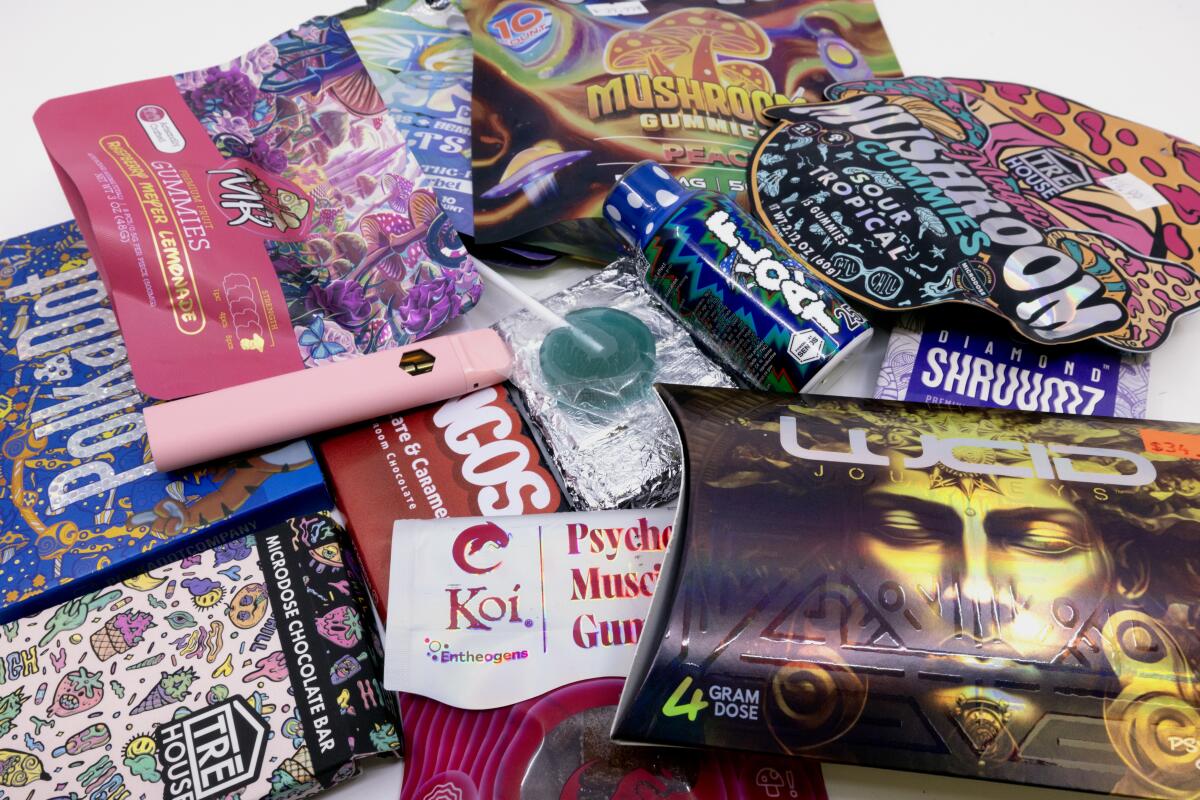
- Share via
Beneath the psychedelic colors and cartoon mushrooms, the labels are often vague: Some claim to be “vegan space capsules” while others warn they are only “novelty collectibles.” A few obliquely say that they contain a “proprietary mushroom blend” or that they are “infused with magic.”
But many of the mushroom chocolates and gummies sold in Southern California head shops, it seems, are not as advertised. This year, the Food and Drug Administration began issuing warnings about one brand’s products after dozens of people who ate them fell ill or died. Federal regulators said tests found synthetic hallucinogens and other psychoactive compounds not listed on the labels. The company, Santa Ana-based Prophet Premium Blends, ultimately recalled all its candies.
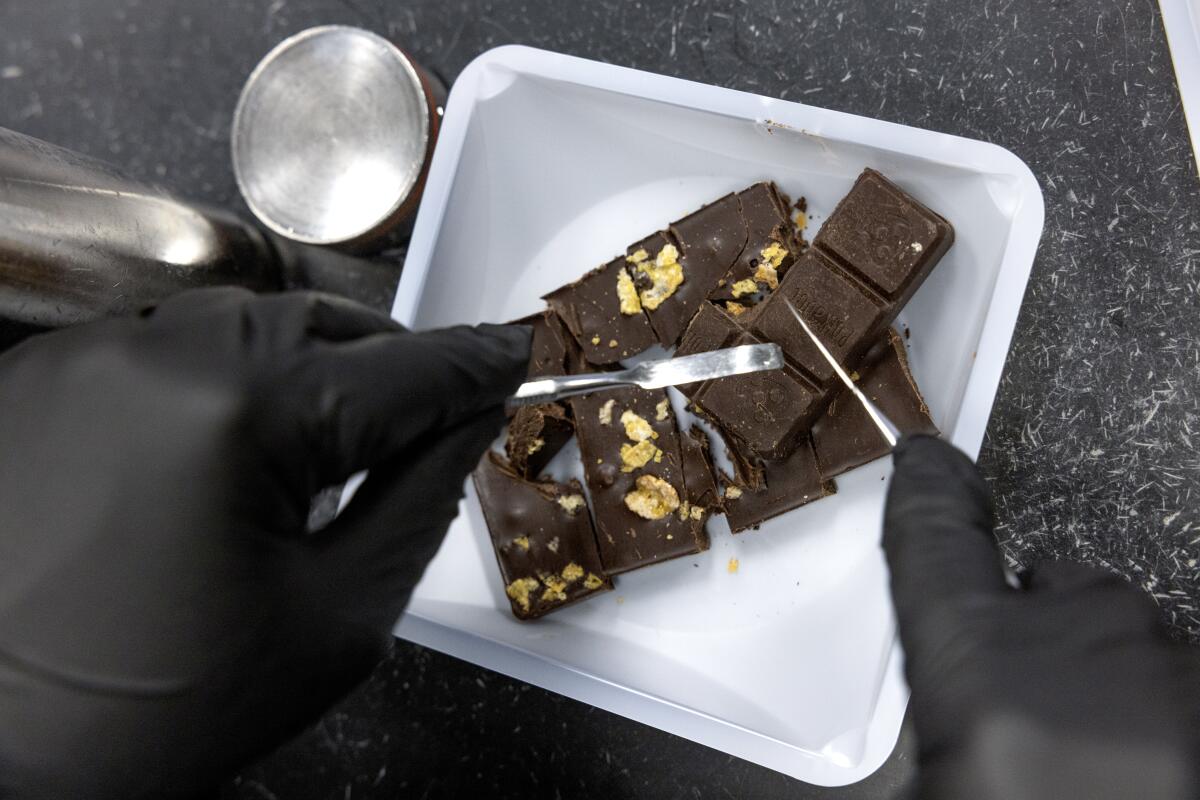
An investigation by The Times found that the problem of questionable mushroom products may be far more widespread. Testing done on 33 samples purchased at smoke shops in Los Angeles and San Diego counties found 40% contained no psilocybin — one of the main chemicals that make mushrooms magical.
Several instead contained widely varying levels of lab-made psychedelic compounds, including those found in the now-recalled Diamond Shruumz items. Some had no hallucinogens at all, a few featured compounds from a different psychoactive fungus with unpleasant side effects, and one contained only bath salts.
Drug experts say that lack of quality control can expose unsuspecting buyers to potentially harmful or illegal compounds and make it difficult to know how strong the products actually are, leading to unexpectedly intense trips and other negative experiences.
“If you tell somebody a thing is a thing, then it should be that thing,” said Reggie Harris, co-founder of the Oakland Hyphae and Hyphae Labs, a mushroom testing company. “It boils down to consent. People should have permission at all times to determine what goes into their body and in what quantities.”
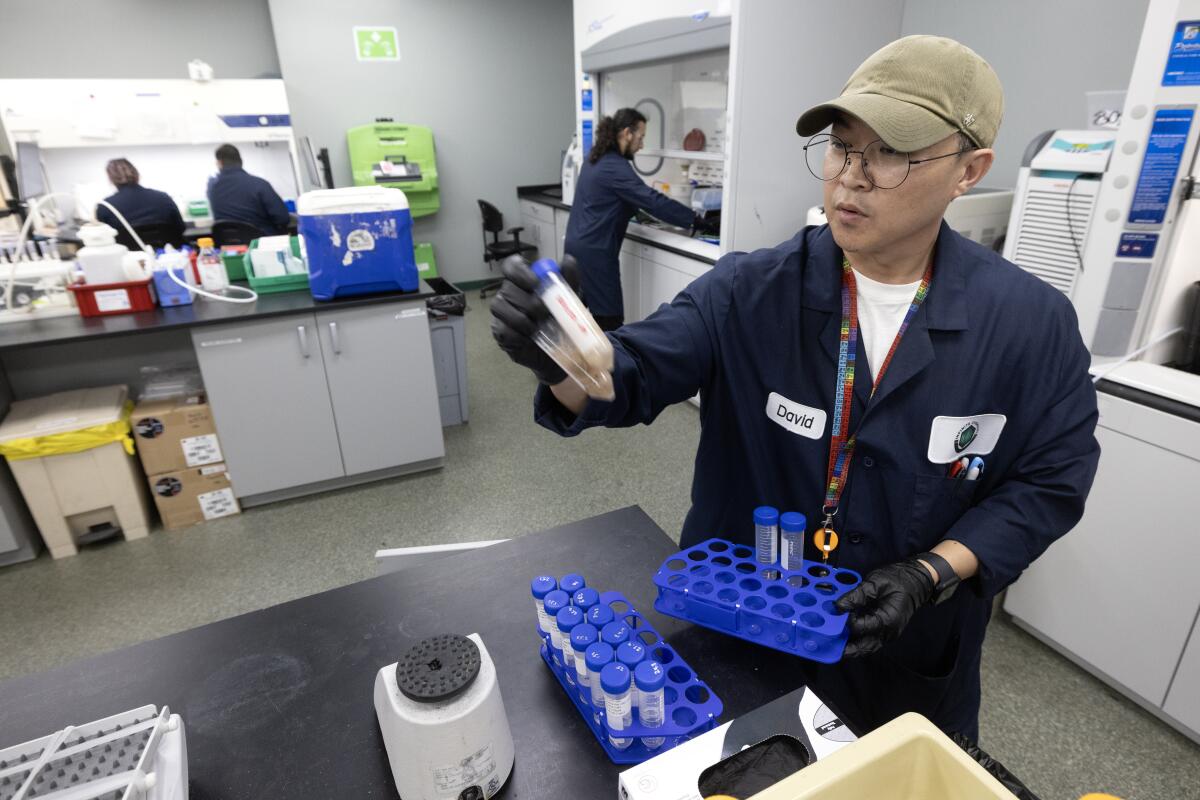
The Times asked mushroom companies for comment. Most, including the maker of Diamond Shruumz, did not respond. One did say its products contained illegal mushrooms. Others questioned the test results or suggested some of the drug-laden products were counterfeit candies imitating legitimate brands.
When reporters asked the FDA for comment, the agency repeated information from previous news releases about the Diamond Shruumz investigation and recall and said it would not discuss possible or ongoing inquiries.
::
Buoyed by enthusiasm from celebrities including Prince Harry and Mike Tyson, mushrooms are having a moment. Along with other psychedelics — such as LSD and ketamine — they have long been trumpeted as a possible treatment for depression, post-traumatic stress disorder, addiction and other mental health diagnoses. The substances have gotten glowing treatment in bestselling books, including Michael Pollan’s influential “How to Change Your Mind,” and films such as “Have a Good Trip.”
A Rand Corp. study published in June estimated that just over 3% of Americans took psilocybin in the last year. In 2023, the study said, it was more widely used than any other hallucinogen.
Amid that surge in popularity, The Times reported last year that some smoke shops and unlicensed dispensaries had begun brazenly displaying and selling psychedelic mushrooms and mushroom-infused candies. Psilocybin is classified as a Schedule I drug, which cannot be legally sold or prescribed in the United States.
Last year, the California Legislature approved a bill to decriminalize some hallucinogens at the state level. Gov. Gavin Newsom vetoed it in October. That apparently hasn’t deterred retailers across the Southland.
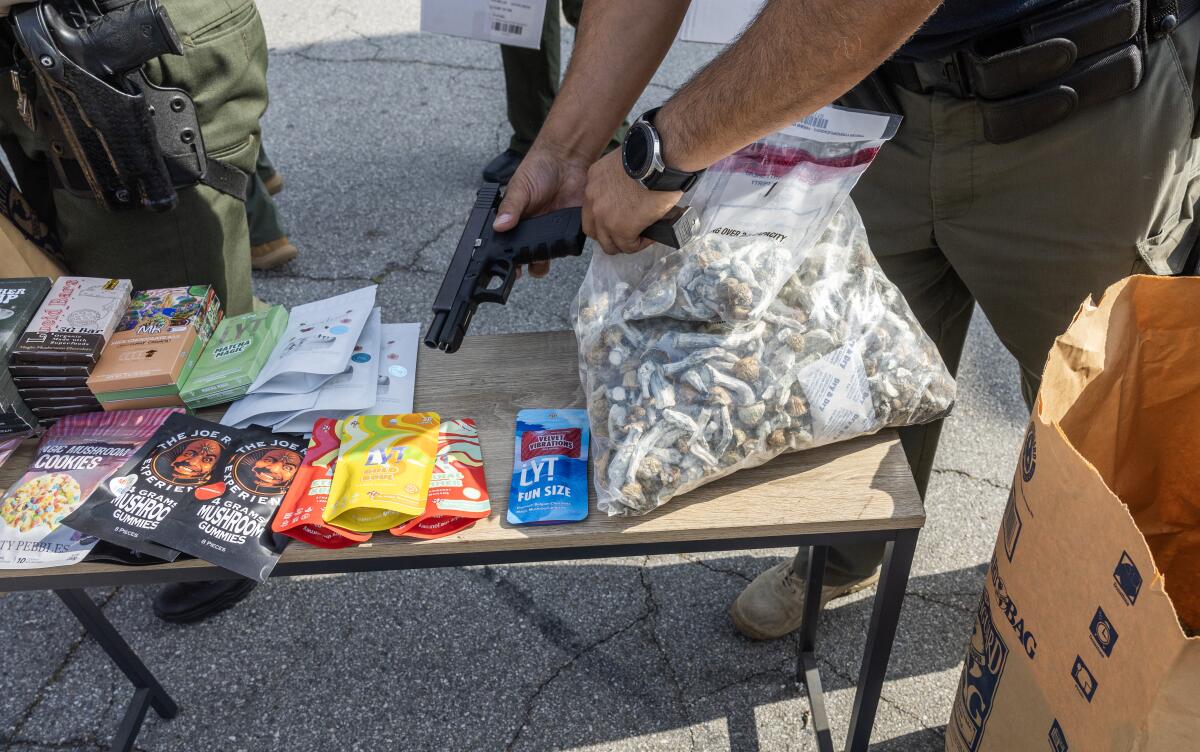
“It was common to see them, but now it’s every dispensary, maybe in the last year,” Lt. Richard White of the Los Angeles County Sheriff’s Department narcotics bureau said during a May raid on an illegal cannabis dispensary in Whittier that netted a large pile of mushroom candies, caps and stems.
The products come in a wide variety of forms, flavors and packages. There are individually wrapped gummies, vapes and full-size candy bars flavored as coffee, cereal or other goodies. Some come in elegant wrappers much like artisanal candy, while others come in trippy, cartoon-splashed baggies.
A few of the neon-bright packages boldly proclaim they contain psilocybin, though many offer more nebulous descriptions such as “mushroom blend” and “magic mushrooms.” A few listed the traditional food ingredients used in the candy but offered only vague information about the type and amount of hallucinogens mixed in.
1
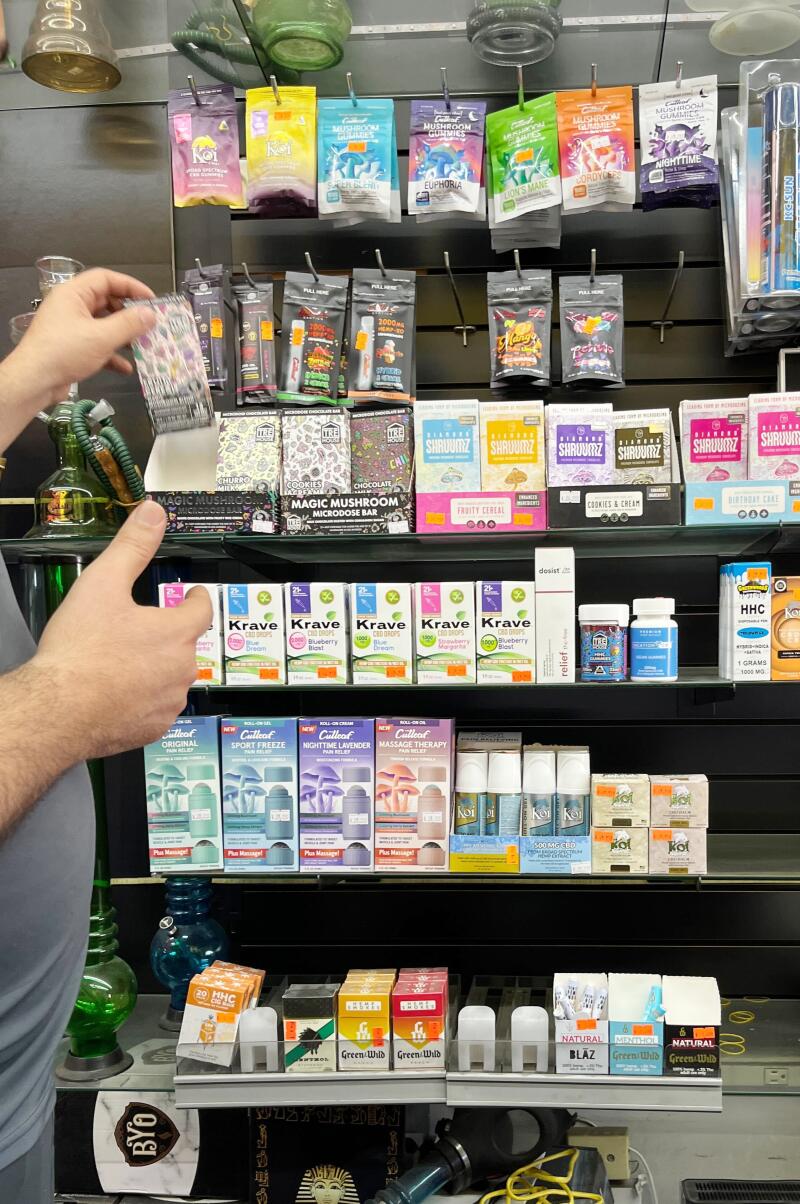
2
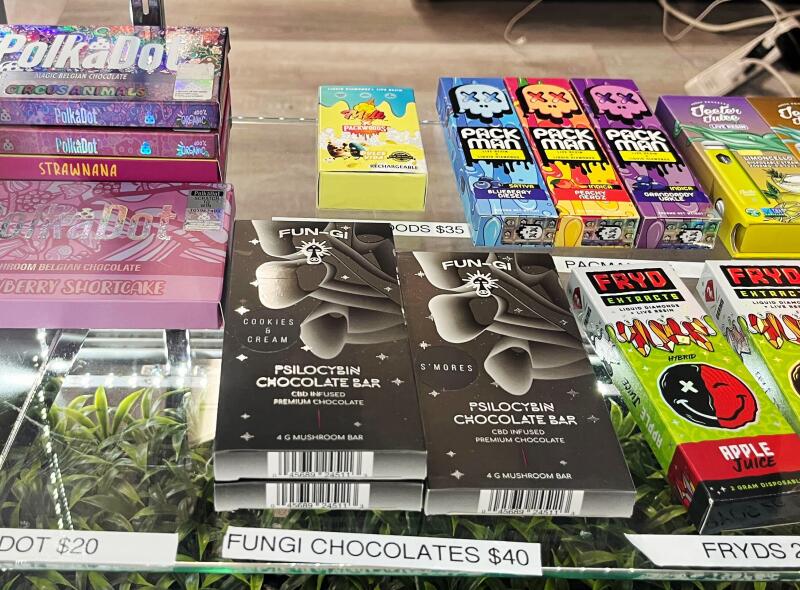
3
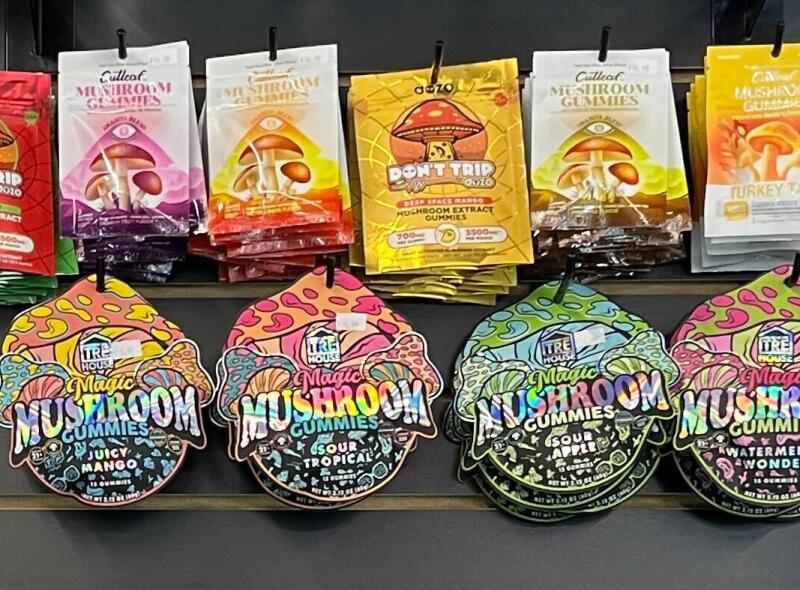
1. A clerk shows off the wide array of mushroom products available for purchase at a smoke shop in San Diego. (Connor Sheets / Los Angeles Time) 2. A wide array of mushroom products is available for purchase at a smoke shop in Long Beach. (Connor Sheets / Los Angele Times) 3. A wide array of mushroom products is available for purchase at a smoke shop in Long Beach. (Connor Sheets / Los Angeles Time)
Packages bearing the labels of some of the best-known brands — such as PolkaDot and Tre House — include QR codes on their packaging so people can “verify” the products aren’t knockoffs. But the codes don’t always lead to the correct company websites, The Times found. Sometimes they link to fake sites made to look like those of major brands. Other times they go to dead social media accounts.
And because packaging that mimics major mushroom brands is sold on several e-commerce platforms — including Alibaba, DHgate and Etsy — it’s nearly impossible for consumers to know who’s actually making the products that populate smoke shop shelves. At least one company pointed to the prevalence of counterfeits when asked why its products tested positive for synthetic hallucinogens.
::
Magic mushrooms bought on the street or grown at home contain a class of natural compounds called tryptamines. Some tryptamines are neurotransmitters, naturally occurring chemical messengers in the brain. But many are psychoactive compounds, such as psilocybin and psilocin. The former is best known as the “magic” part of magic mushrooms. After ingestion, the body breaks it down into the latter — and the trip begins.
Some products sold as mushroom chocolates or candies instead contain a synthetic psychoactive tryptamine called 4-acetoxy-dimethyltryptamine, or 4-AcO-DMT. Like psilocybin, the compound breaks down into psilocin inside the body and kicks off a psychedelic trip.
Even though the chemicals are closely related, the psychedelic experiences they spark can be noticeably different. For one, because they contain tough-to-digest chitin — the same compound that’s in crab shells and insect exoskeletons — the effects of natural mushrooms often take a little longer to hit than synthetics and more often cause stomach upset, drug experts said. And while psilocybin is illegal under federal law, 4-AcO-DMT is not officially a controlled substance. However, some drug experts said it is chemically similar enough that it could fall into a legal gray area.
In response to questions from The Times, the Drug Enforcement Administration did not offer a clear answer about the legality of 4-AcO-DMT. The FDA said “at this point” the agency is “not commenting on the lawfulness of particular ingredients.”
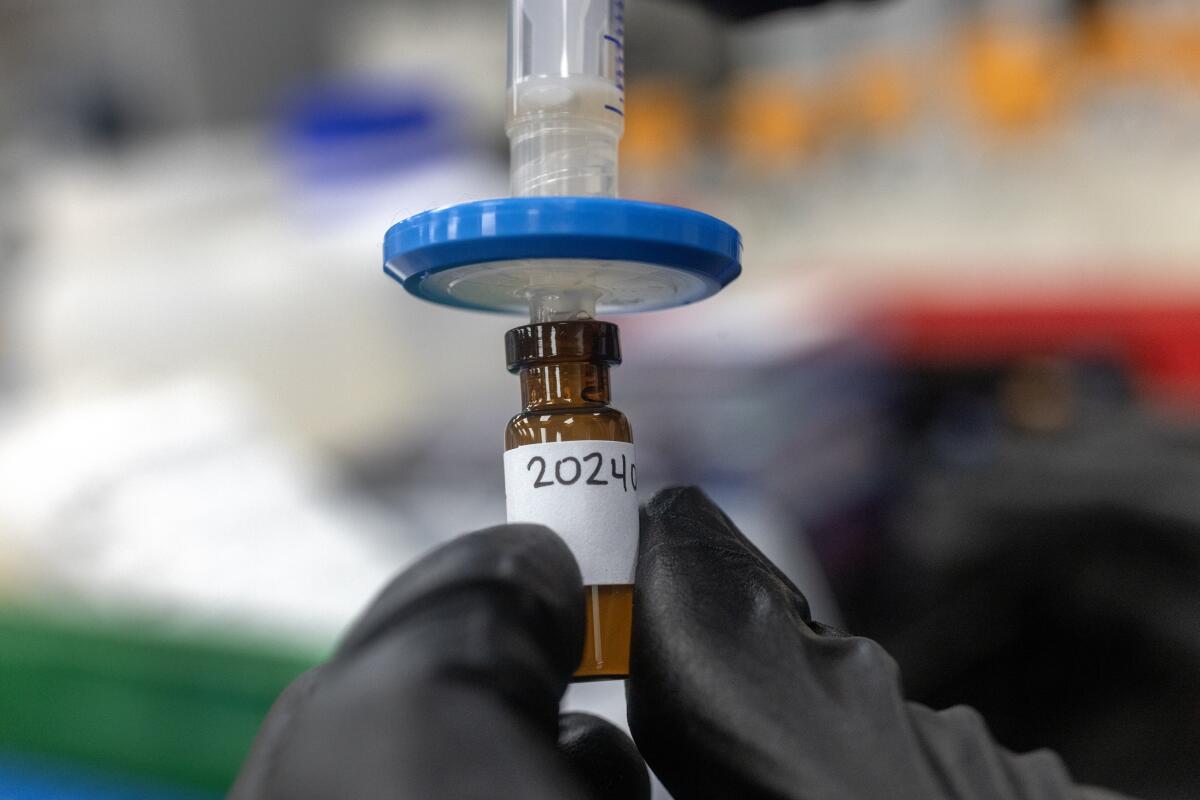
Of the 33 products The Times had tested, eight contained 4-AcO-DMT — usually instead of psilocybin but sometimes in addition to it. That percentage is in line with what scientists at commercial laboratories say they’ve typically found.
“We’re generally seeing around 10[%] to 30% of products have 4-AcO-DMT in them,” said Christopher Pauli, one of the founders of Tryptomics, the Colorado-based company that performed some testing for The Times.
There are a few reasons the makers of mushroom products might pick synthetic tryptamines over ground-up mushrooms or mushroom extract, explained Tomas Garrett, lead scientist at Oakland Hyphae.
For one, lab-made compounds don’t require the space and time to grow that a fungus does, and the final product is easier to mix into large batches of candy. There’s no earthy taste to cover up, and for bulk production, Garrett said, it might make more financial sense.
“At a certain point it becomes more economically feasible to do 4-AcO-DMT or something else where they can dose out the things at scale,” he said.
In addition to psilocybin, psilocin and 4-AcO-DMT, Garrett said, mushroom products can contain other psychoactive tryptamines, as well as an array of other compounds.
In San Diego, one product scientists tested for The Times — a vape pen with a cartoon mushroom and the words “premium mushroom extract” and “not for human consumption” on the box — actually contained bath salts. In L.A., two products did not contain any tryptamines but tested positive for muscimol, one of the compounds found in Amanita muscaria, a legal kind of hallucinogenic mushroom linked to uncomfortable side effects such as sweating and excessive salivation.
::
As mushrooms and mushroom products have become increasingly popular, some commercial laboratories have developed their own methods for testing them.
Infinite Chemical Analysis Labs launched eight years ago as a cannabis-testing company; over the last two years, it has begun analyzing mushroom products as well.
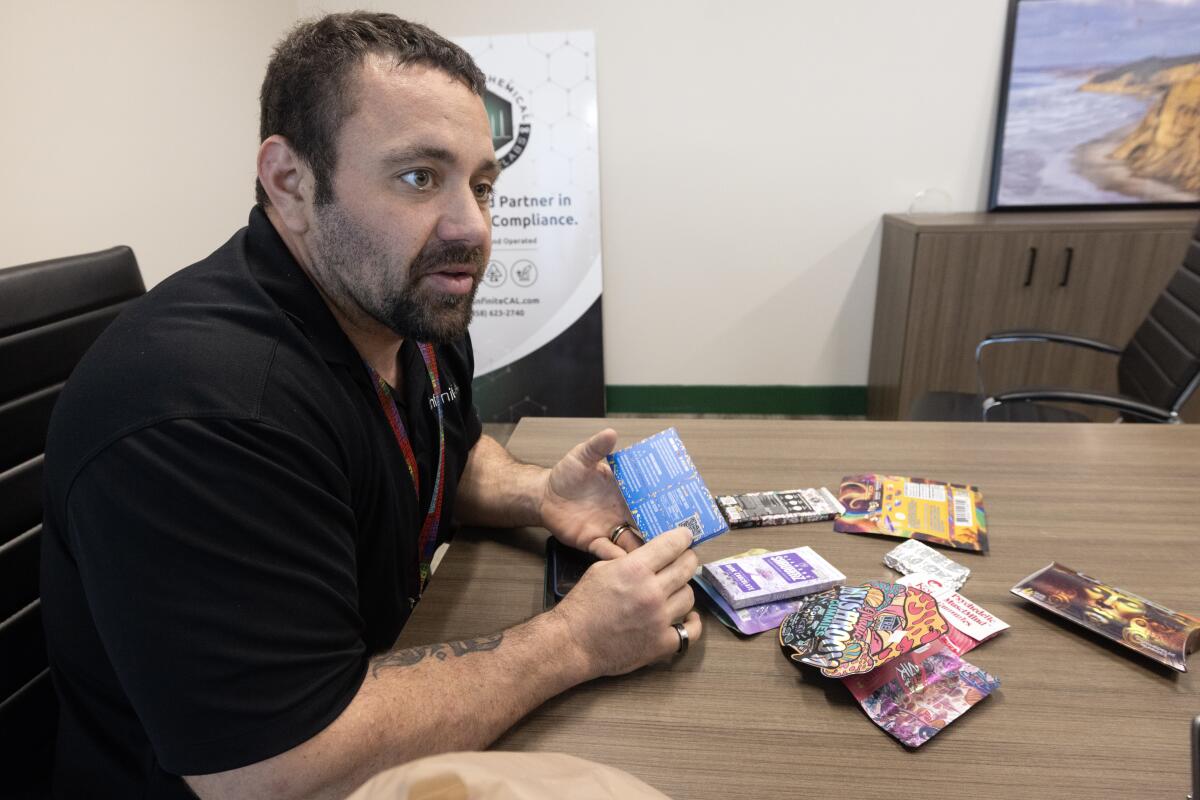
Tucked between car repair shops and shipping facilities, the lab is a dozen miles north of downtown San Diego.
Beyond the sparsely appointed lobby is a warren of fluorescent-lighted hallways and antiseptic rooms that bring to mind a high school chemistry class. But the testing equipment they hold is sophisticated enough to detect an array of compounds, including heavy metals, pesticides, hallucinogens and fentanyl.
Using that equipment to test chocolates or gummies is a little harder than using it to test pills or powders, according to the firm’s co-founder Josh Swider. To prepare The Times’ candy samples for analysis, Infinite CAL scientists froze them in liquid nitrogen to make them brittle. Then they used a grinder to pulverize the frozen sweets into a coarse powder.
Next, scientists used highly sensitive mass spectrometers and other analytic equipment to test the products for psilocybin and other tryptamines. A short while later, results popped up on a computer screen, and the lab team started analyzing them to figure out which compounds were present.
Over the last couple of years, scientists at the San Diego lab say, they have tested hundreds of mushroom products and found substances as diverse as THC, LSD and MDMA — the active ingredient in the club drug ecstasy.
“When you buy an illegal narcotic, there’s an expectation it may not be what you think,” lab director Erik Paulson said. “But I think there’s a good subset of the population that’s buying these and believing everything that’s on the package.”
Even some in the industry have raised concerns about inaccurate labeling. John — the founder of Mother’s Magic, maker of a mushroom chocolate bar and bag of mushroom capsules purchased in Long Beach — said he started his Colorado-based company in 2019 as a small operation to manufacture and sell products to friends. John spoke on the condition that his last name not be used because his business produces and sells illegal goods.
Over the years, he said, he moved into selling them to smoke shops and other retailers. And while he adds only psilocybin mushrooms to his products, he said, many other purveyors infuse mushroom goods with a range of substances.
“I went to a couple swap meet sort of deals and talked to people,” he said. “I never heard anything that seemed legit.”
In addition to unlisted ingredients, drug experts raised concerns about the accuracy of the listed dosages.
“There’s no quality control,” Paulson said. “The person making the gummies and the chocolates, they might put five times the amount in one package of gummies” versus another.
Some mushroom products advertise specific ingredient amounts — such as “3.5g Psilocybin Cubensis” or “6g of Fruiting Bodies” — but testing showed those didn’t always correlate to relative strengths.
Others provide only vague “dosing guidelines,” such as how many chocolate squares is considered a “therapeutic dose,” and how many constitutes a “heroic dose, full depth trip experience.”
Federal regulators haven’t said exactly what they believe caused the bad reactions that led to the Diamond Shruumz recall this year, though initial reports hinted dosing may have been partly to blame.
In June, Prophet Premium Blends — the maker of Diamond Shruumz — told federal officials the problem was “toxic levels” of muscimol, according to a news release. But later testing by regulators instead detected 4-AcO-DMT, and the FDA told The Times it is still evaluating the company’s claim that the products contain muscimol.
The company did not respond to a question about why its goods contain 4-AcO-DMT, or other questions about the contents.
::
The smoke shop near a busy intersection in a gentrifying Long Beach neighborhood looked much like any other — one wall had a vast array of bongs and glassware, another featured dozens of brands of nicotine vapes. Drake’s “Do Not Disturb” blared in the background as a couple of customers perused the paraphernalia.
And, as in many other Southern California smoke shops, there was a small selection of mushroom chocolates, gummies and several baggies of gray capsules arranged in a brightly lighted glass case toward the back of the store.
The cashier perked up when asked about the mushroom products.
“These chocolates are really good,” she said, pointing to an Oreo-flavored candy bar with Silly Farms branding. “These ones are good too, and then we have some PolkaDots also.”
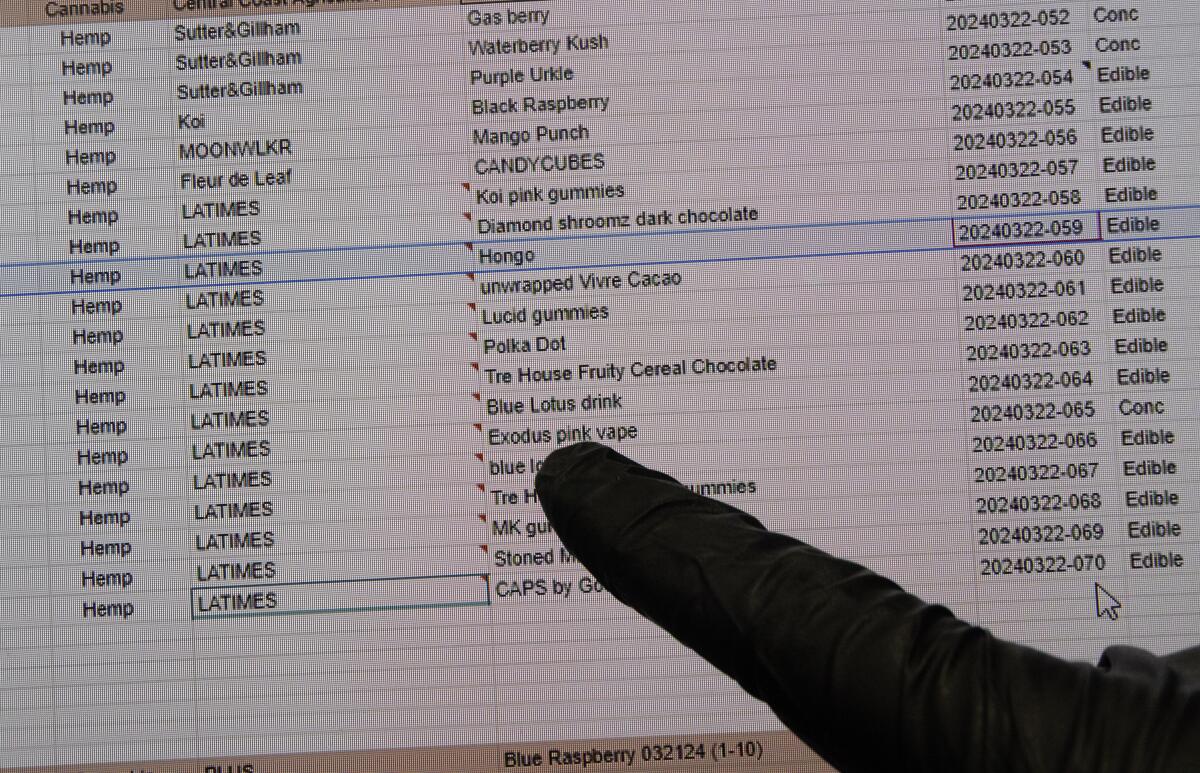
Lab testing of samples from both brands later showed they contained psilocybin, though neither said so on the package. The website for Silly Farms chocolates mentioned only legal Amanita muscaria extract as an ingredient, saying nothing about the presence of illicit psilocybin.
When asked about Amanita edibles, the Long Beach clerk described them as “basically fake psilocybin.” The label for one Amanita candy brand — Stoned — offered a more colorful description, boasting that three gummies would cause “UFO sightings” and four an “alien abduction.”
But it was a pack of 35 Mother’s Magic capsules filled with a beige powder that the clerk said was her favorite.
“These will really help you focus a lot,” she said. “It’s actual psilocybin.”
The brown package brazenly listed “Psilocybin Cubensis” — the scientific name for magic mushrooms — as an ingredient. For once, testing showed the claims on the label appeared to be true.
As reporters turned to leave, the cashier handed over a printed flier with a coupon for mushroom products:
“Use this and you can get $5 off your next purchase.”
More to Read
Sign up for Essential California
The most important California stories and recommendations in your inbox every morning.
You may occasionally receive promotional content from the Los Angeles Times.












